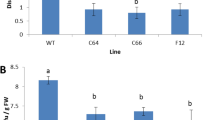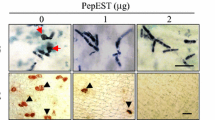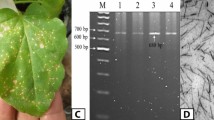Abstract.
Polyphenol oxidases (PPOs; EC 1.10.3.2 or EC 1.14.18.1) catalyzing the oxygen-dependent oxidation of phenols to quinones are ubiquitous among angiosperms and assumed to be involved in plant defense against pests and pathogens. In order to investigate the role of PPO in plant disease resistance, we made transgenic tomato (Lycopersicon esculentum Mill. cv. Money Maker) plants that overexpressed a potato (Solanum tuberosum L.) PPO cDNA under control of the cauliflower mosaic virus 35S promoter. The transgenic plants expressed up to 30-fold increases in PPO transcripts and 5- to 10-fold increases in PPO activity and immunodetectable PPO. As expected, these PPO-overexpressing transgenic plants oxidized the endogenous phenolic substrate pool at a higher rate than control plants. Three independent transgenic lines were selected to assess their interaction with the bacterial pathogen Pseudomonas syringae pv. tomato. The PPO-overexpressing tomato plants exhibited a great increase in resistance to P. syringae. Compared with control plants, these transgenic lines showed less severity of disease symptoms, with over 15-fold fewer lesions, and strong inhibition of bacterial growth, with over 100-fold reduction of bacterial population in the infected leaves. These results demonstrate the importance of PPO-mediated phenolic oxidation in restricting plant disease development.
Similar content being viewed by others
Author information
Authors and Affiliations
Additional information
Electronic Publication
Rights and permissions
About this article
Cite this article
Li, L., Steffens, J.C. Overexpression of polyphenol oxidase in transgenic tomato plants results in enhanced bacterial disease resistance. Planta 215, 239–247 (2002). https://doi.org/10.1007/s00425-002-0750-4
Received:
Accepted:
Issue Date:
DOI: https://doi.org/10.1007/s00425-002-0750-4




